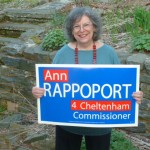ISSUES
A number of serious issues face Cheltenham Township. Addressing these wisely will require Cheltenham residents and their leaders to work together to encourage and develop our most creative and thoughtful solutions.
- TAX BASE. Cheltenham’s notoriously high taxes stem in part from our historic character as a residential community and hub for non-profit institutions. Our commercial properties aren’t generating enough revenue to support our aging infrastructure – including public school services – that we value and require to sustain our competitive attractiveness in the region. Unfortunately, our disproportionately high taxes are hurting our real estate values and jeopardizing this competitive attractiveness itself.
In order to address this problem, we’ll need to combine several initiatives: Enhance the effectiveness of the commercial tax base we already have (including our two underperforming malls on Cheltenham Avenue); increase our commercial tax base; ensure that expenditures are thoughtfully monitored and prioritized; embrace and promote our strengths in innovative ways to capitalize on them.
Ann has been attending meetings of the Economic Development Task Force Committee (among other working groups) in order to stay informed on the latest challenges and initiatives to strengthen our township’s economy. She has been speaking informally with local business owners about their concerns and ideas for improving the business climate in Cheltenham, and hopes to continue and perhaps formalize such sessions in the future. She continues to subscribe to and study professional journals about municipal governance.
- SUSTAINABILITY. Cheltenham must continue to be a leader in environmental sustainability. It is not enough to pass a sustainability plan; we must implement it. The 10 goals are not just sweet statements- they contain critical, measurable standards, which we must accomplish if we are to preserve community life for our heirs. Some of them represent more of what we’re already doing; some represent new actions. We can either lead the region in this effort, or wait and be dragged along by circumstances or by other communities on their terms.
Many Cheltenham residents are pioneers and experts in sustainability fields, including horticulture, transportation, energy, architecture, etc. They are eager guides to help smoothly navigate our inevitable transition to sustainable living. Let’s do it our way and be the model for others.
Ann’s green track record dates back before 1979. She’s been actively involved in statewide and regional water quality, natural resources, health and transit issues, and intends to continue supporting responsible stewardship. She helped coordinate some recent tree plantings in Cheltenham and participates in community clean-up efforts.
- INFRASTRUCTURE. Water, sewer and transit issues loom large in Cheltenham’s attention (and expenditures). Flooding must be brought under control and preventive steps implemented. The sanitary sewer system is in the process of being brought into compliance with DEP regulations as Act 537 is revised and adopted. Transit issues range from the repair of damaged roads, to the need for safer, more welcoming walking and biking commutes, to controversy on the best way to improve access to regional rail.
It’s crucial to consider development through the lenses of flooding, waste and transit management, and from a regional, as well as local basis. Deferred maintenance is no longer an option, if indeed it ever really was. Forward thinking, rather than makeshift patchworking, must be the approach.
Ann has been examining flood, sewer and transit planning documents and attending public meetings on these issues. She has raised questions and submitted written inquiries and comments as she sees fit and at those times when formal public input is accepted. She continues to be vigilant, share information she has learned and solicit informed opinions of others on these challenges.
- TRANSPARENCY & ACCESSIBILITY. Self-governance requires vigilance and commitment from citizens, yet we all know how hard that is in the reality of our busy lives. So we often rely on trusted representatives and leaders to reach out to us to summarize and translate relevant matters for us.
Even though the Township provides a website, televised commissioners meetings, email updates, an informative calendar publication and quarterly mailings, many residents remain uninformed on vital issues that concern them. Additional approaches must be explored to enhance communication (reciprocally) between Cheltenham Township and residents.
Going door-to-door, Ann has met residents with ideas that warrant consideration, questions that deserve answers and voices that haven’t been acknowledged. The power of personal conversation suggests continued – and greater – use of this form of communication. Ann expects to make rounds of the neighborhoods even after she is elected and to recruit block “captains” to help with information flow. She’ll ramp up use of social media. In addition, she expects the township to provide residents with helpful guides – for example, a one-page flow chart to explain the various phases and players in the zoning process – to help make local government more transparent and user-friendly.
- DIVERSE ASSETS. Cheltenham seems to have dropped off the radar screen of many brokers and opinion leaders as a hot place to live and work. Yet this should not be the case, given our Township’s remarkable human talent, location, historical and cultural assets. Cheltenham seems to be “under-performing” relative to its potential.
Cheltenham is home to intellectual, artistic and research leaders in the region. It offers a 20-minute commute to Center City from 4 different rail stations. Cheltenham is proud of its universities, its historic sites and welcoming neighborhoods.
Ann is committed to helping Cheltenham live up to its potential. We need to re-define ourselves in terms of our strengths – our environmental leadership, our diverse, creative energy, our brains and hard work. And we need to aggressively market our image as an innovative, exciting college and residential community with the hangouts and shops to match.
